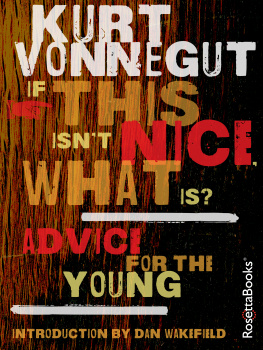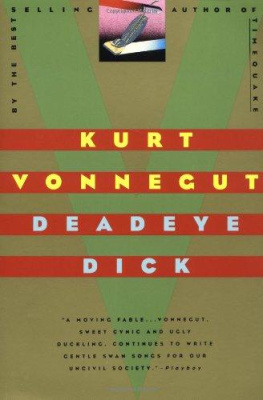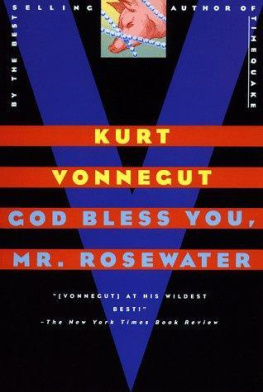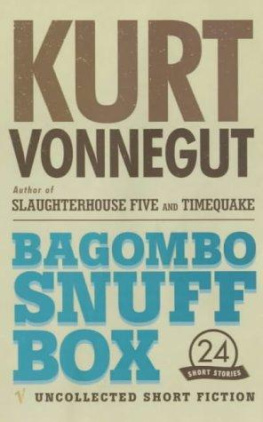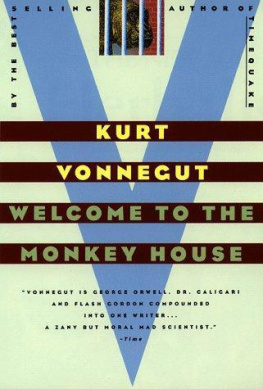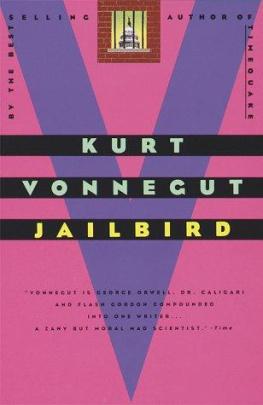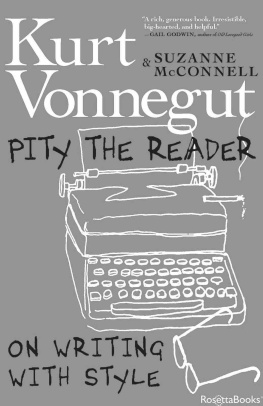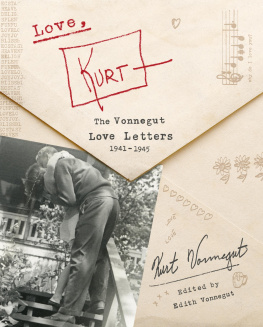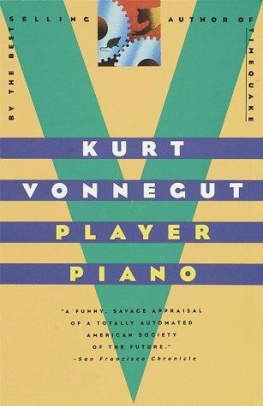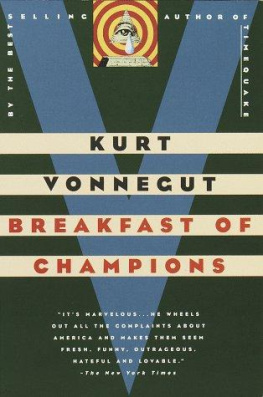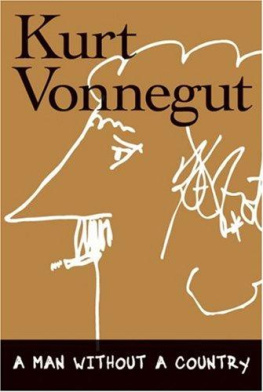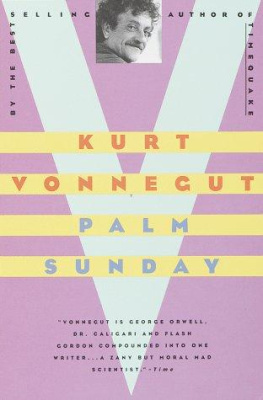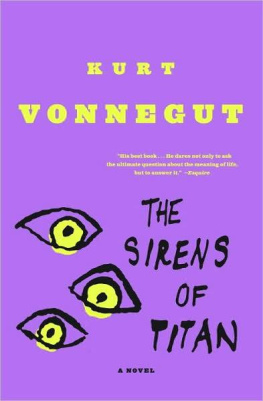
If This Isnt Nice, What Is?
Advice for the Young
Kurt Vonnegut
Introduction by Dan Wakefield
Copyright
If This Isnt Nice, What Is?
Copyright 2013 by Kurt Vonnegut Jr. Copyright Trust
Cover art to the electronic edition copyright 2013 by RosettaBooks LLC.
All rights reserved. No part of this book may be used or reproduced in any form or by any electronic or mechanical means, including information storage and retrieval systems, without permission in writing from the publisher, except by a reviewer who may quote brief passages in a review.
Electronic edition published 2013 by RosettaBooks LLC, New York.
Cover jacket design by Misha Beletsky.
ISBN ePub edition: 9780795333637
Contents
Do you have a favorite Kurt Vonnegut quote? Join in on the discussion and share your thoughts with other Vonnegut fans at www.mywejit.com/#!vonnegut.
After the publication of his novel Slaughterhouse-Five brought him worldwide acclaim in 1969, Kurt Vonnegut became one of Americas most popular graduation speakers. Even before that first of many best-sellers was published, Vonnegut had become an underground hero of the youth of the sixties who were hungry for new ways of looking at the world and alternatives to the status quo. College students were passing around dog-eared paperback copies of his earlier novels, such as Cats Cradle and The Sirens of Titan, even before Slaughterhouse-Five had made him a household name. From his earliest short stories that were published in the popular weeklies of the nineteen-fifties, including Colliers and The Saturday Evening Post, Vonneguts work spoke to young people, and that appeal has never faded. His novels, essays, and stories are taught in colleges and high schools throughout the U.S., and as Prof. Shaun OConnell of the University of Massachusetts at Boston has told me, Its hard to get students to read Updike and Bellow any more, but they still love Vonnegut.
To his surprise and chagrin, Vonnegut was hailed as a spokesman of youth and a hero of the counterculture of the sixties, yet he was, ironically, a counter-counterculture figure. He satirized the easy promises to inner and world peace being peddled by the Maharishi Mahesh Yogi in an article for Esquire called Yes, We Have No Nirvanas. As Eastern meditations such as Zen became a fad, Vonnegut maintained that we had our own Western method of achieving the same results of slowing the heartbeat and stilling the mind; it was called reading short stories. He called this practice Buddhist Catnaps. He was not, however, one of those adults of the era who found nothing to admire in the youth culture. He had written that The function of the artist is to make people like life better than before, and when asked if hed ever seen that done he answered, Yes, the Beatles did it.
He also loved the blues, and jazz. He wrote to a friendly literary critic that, During my childhood in Indianapolis, local jazz musicians excited me and made me happy.
He did not believe drugs had such an effect. In one speech in this collection, he tells his audience: Ive been a coward about heroin and cocaine and LSD and so on. I did smoke a joint of marijuana one time with Jerry Garcia of the Grateful Dead, just to be sociable. It didnt seem to do anything to me, one way or the other, so I never did it again.
Hardly the words of a hippie. One of the well-known hippies of that era, the writer Raymond Mungo, invited me and Vonnegut to visit the commune he started in Brattleboro, Vermont (and later wrote about in his memoir Total Loss Farm). He told us that one reason he and his friends wanted to start the commune and learn to live off the land in a simple way was that we want to be the last people on earth. Vonnegut said, Isnt that kind of a stuck-up kind of thing to want to be?
In the way he spoke and the way he wrote, Vonnegut was always coming up with the plain-spoken words and phrases that people thought but didnt say, the ideas that expressed inner feelings, that rattled preconceptions and made you look at things from a different angle. He was the one who pointed out the elephant in the room, the one who saw that the Emperor had no clothes.
That same Raymond Mungo who ushered me and Vonnegut around his commune in 1970 emailed me recently after reading a book of Vonneguts Letters that Kurt was and remains an important writer and one who will be read beyond all our lifetimes. A new generation of Vonnegut fans was introduced to his work in 2005 when he appeared on The Daily Show with Jon Stewart with his last book, A Man Without a Country, and teenagers are still moved today by his stories such as Harrison Bergeron that are taught in high school classes.
Vonnegut neither wrote down to his readers nor tried to go over their heads with wisdom. He was playful at the same time he was profound, and in that same style and spirit he spoke to graduating classes. He did not speak to them as if they were a different, lesser breed because they were young; he disdained generation generalizations. He told one of these graduating classes we are not members of different generations, as unlike, as some people would have us believe, as Eskimos and Australian Aborigines. We are all so close to each other in time that we should think of ourselves as brothers and sisters. Whenever my children complain about the planet to me, I say Shut up! I just got here myself. (Vonnegut had three children of his own, and adopted four others.)
Popular as he was as a graduation speaker, Vonnegut never graduated from college. He left Cornell to join the Army in World War II, and the Army sent him to study bacteriology at Butler University and mechanical engineering at Carnegie Tech and the University of Tennessee, then assigned him to the infantry and gave him a rifle. While serving as an advanced scout for the 106th Infantry in the Battle of the Bulge, he was captured by the Germans and sent to a prisoner of war Camp in Dresden, where he survived the firebombing of that city while quartered in an underground meat locker called Slaughterhouse-Five. When he came home from the war he studied anthropology at the University of Chicago on the G.I. Bill and worked as a reporter for the Chicago News Bureau. Although he completed all the course work for his masters degree, his ideas for a thesis were turned down, and he had to move on to take a job in public relations at General Electric. He was given an honorary degree by the university years later, after he was famous.
So it goes
Vonneguts fame as a writer did not come until he was 47 years old. Before that he struggled to support a large familynot only his wife and their own three children, but three children of his sister who died of cancer at age 41, a day after her husband had been killed when his commuter train crashed off a bridge. The popular weekly magazines of the fifties, whose payments for his short stories enabled Vonnegut to leave his job at General Electric, died off with the advent of television, and he had to scramble to make a living. He failed to sell a shirt company on his idea for a new kind of bow tie, had no success creating a new board game, opened a dealership for Saab automobiles when they were as yet little known in this country, and when that failed, commuted to Boston to write for an ad agency; he was turned down for a job teaching English at Cape Cod Community College, taught at a school for troubled boys, was turned down for a Guggenheim Fellowship, and through it all, kept writing. He died, in 2007, at the age of 84, still writing.
He was not about to peddle cut-rate formulas for overnight success or blue-sky bromides to young people who sought his advice.
Next page
